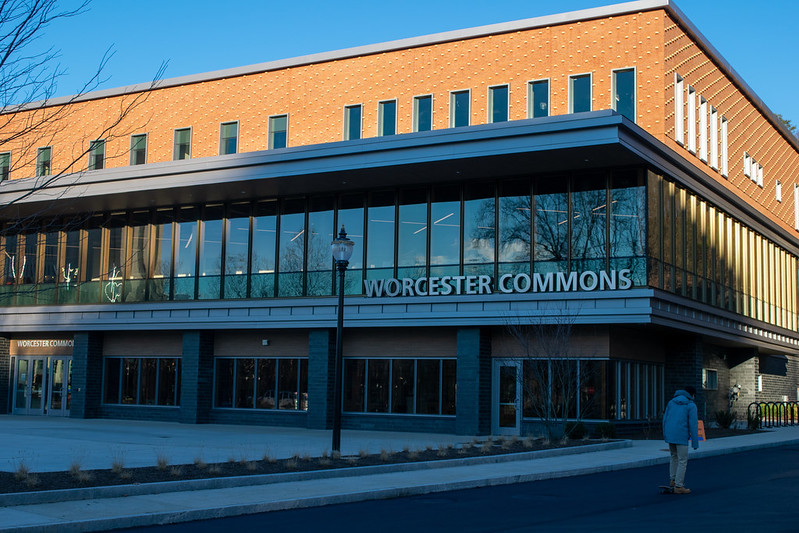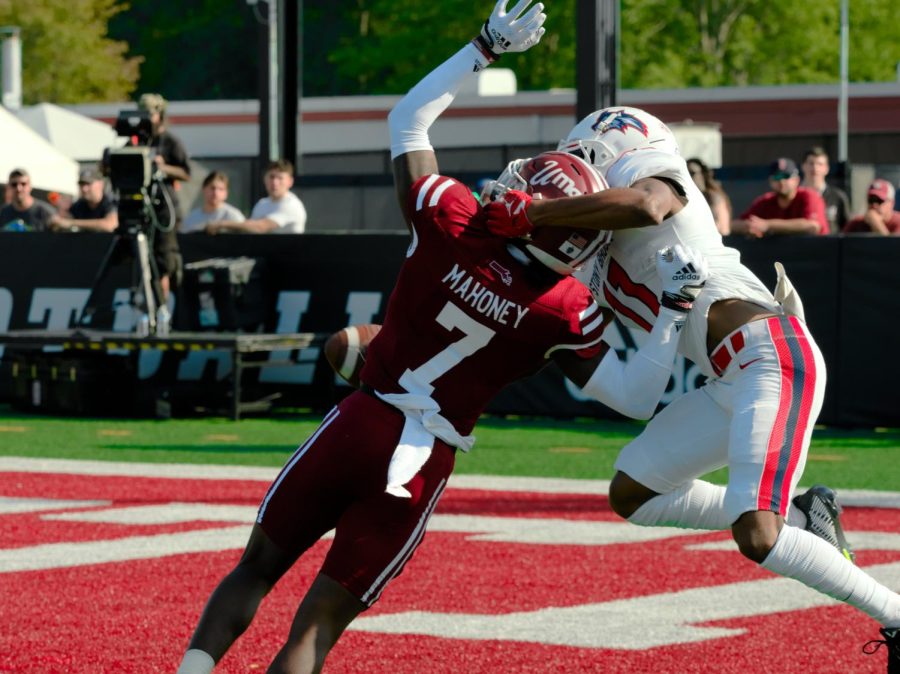At the University of Massachusetts, COVID-19 has not only changed what life looks like for students, but it has also caused significant workplace adjustments and challenges for professional and student frontline workers.
Since the beginning of the spring semester, 27 UMass non-student staff members and two faculty members have tested positive for COVID-19, according to an email statement from Mary Dettloff, deputy director of UMass News & Media Relations, on Feb. 26.
Workers from different areas on campus shared their experiences since the arrival of students on campus, voicing concerns regarding staffing issues, enforcement of COVID-19 rules, student behavior and proper COVID-19 protections.
In the dining halls, plexiglass has been installed at all of the food counters to separate workers from diners. Workers place food in serving windows to limit interaction and they are required to get once-weekly asymptomatic testing. Students now tap their own UCards for entry into the dining halls, rather than handing it to an employee to scan them in.
Jennifer Churchill, an employee at Berkshire Dining Hall, described being worried about coming into work because of students’ loose adherence to COVID-19 precautions.
In the dining hall, she has noticed students improperly wearing masks or not social distancing enough. Most often, the burden falls onto her and her coworkers to enforce COVID-19 rules on students and remind them about how to properly wear masks.
The challenge, Churchill describes, is that “there’s so many [workers] versus so many students. The ratio is insane… it’s hard to enforce and just keep track of everybody.” She referenced the smaller number of workers due to University furloughs of some dining hall workers. Some employees are currently working at part-time hours, but she noted that more have been returning this week.
Regarding the responsibility of constantly reminding students of safety rules, Churchill said, “It’s exhausting. I babysat toddlers that have behaved better than some of the students. That’s really sad.” A coworker shared a story with her about getting flipped off by a student after asking him to properly wear his face mask.
Being a frontline worker while cases at the University soared caused her stress for her health. “Every time I get my negative asymptomatic testing, I just breathe a little bit of relief,” Churchill said.
Still, she notes that this is not how all students at the University are behaving. “There are students that are super good about it, they social distance ,.. they wear two masks and it makes me super happy when I see that.”
In the residence halls, employees of Residence Hall Security started a petition asking for improvements of safety measures at the security desks. Residence Hall Security employs over 200 students who work as security monitors, responsible for signing in residents of dorms between the hours of 8 p.m. to 12 a.m. on weekdays and from 8 p.m. to 3 a.m. on weekends.
One worker within RHS spoke with the Collegian about the petition and their experience as a worker. Their identity is being kept anonymous in order to avoid retribution against them.
According to the source, about 250 people have signed the petition so far, and 60 percent of RHS staff who have seen the petition have signed it. They noted that some employees specifically cited fear of being fired as reason for not signing the petition.
The RHS employee noted that current safety measures for residential hall security staff include plexiglass in front of the desks where students come to sign in, giving workers single-use masks and disinfectant wipes in plastic bags for wiping down their surface.
The petition asks for improvements in these conditions, listing as requests: “reusable masks (like they gave everyone else on campus…) … wipes that aren’t in plastic bags… more glass to the monitor desks so that they’re actually shielded from the places where people walk by.”
The source noted that the plexiglass does not fully shield the workers in some residence halls.
“I can confirm that whenever residents want to talk to us, they walk just around the glass. I’ve also had residents walk just past the glass and then pull down their masks to talk to me,” said the source.
The source also voiced frustration with the little guidance on how to operate under the COVID-19 restrictions this semester. They mentioned that their boss had told them that they did not have to enforce masking rules when students check in to their residence halls improperly weaning masks but, rather, that they should just file an incident report.
The RHS employee added, however, that finding the incident report form online is difficult. “It felt like they didn’t want us to be writing up people who were breaking COVID protocols,” they added.
Before the University’s shift to the High Alert posture, which banned all student gatherings, the source noted that students would often exceed the maximum capacity numbers in common areas of the dorms, leaving RHS staff to enforce rules. RHS workers were left unknowing what protocol to follow. The source reported having no instruction of whether they are allowed to ask students who break rules for their IDs to file an incident report with.
“We can’t write people up and it feels really terrible and powerless that we’re working in the dorms and we’re always running into these big groups of people who are violating the COVID procedures and we’re getting no acknowledgement of the fact that we’re being put in danger by their behavior and by the fact that UMass has done nothing to protect us,” they said.
The petition also calls on the University to assist in the faster hiring of new RHS employees. Currently, the source reports that RHS is understaffed, leaving many dorm buildings without any security monitors on some nights.
“When buildings are empty anyone who wants to can go into them,” the source said. “People are taking note of which buildings are empty and bringing people in, especially when they’re freshmen buildings.”
Dettloff stated that “We [the University] have sufficient staff to maintain and clean the resident halls, academic spaces and dining commons.”
The source also noted hearing from other coworkers that they are thinking about quitting their job because of how unsafe they feel. RHS monitors work for shifts that range from 6-7 hours long in dorms where residents are coming in and out.
“The contact tracing system is so swamped that we know there’s still people in the dorms who have COVID or have been exposed to COVID and don’t know they’ve been exposed to COVID yet. And we are being exposed to those people,” the source said, referring to the University’s strained contact tracing.
“My roommate and I are prepared for the fact that we’re going to have to probably lock down because there’s a decent chance that I’m going to get COVID from my job, even after doing everything right,” said the source.
Dettloff said, “Contact tracing for employees is handled much the same as it is for students,” said Dettloff “Employees who have tested positive or who are identified as a close contact are expected to isolate or quarantine at their home for 10-14 days, depending on their symptoms and severity of their illness. They should participate in COVID testing during that time at University Health Services. Employees may use their accrued sick or vacation leave to cover the isolation or quarantine period.”
The ongoing furloughs and layoffs at the University has directly exposed many workers to COVID-19, according to the Leslie Marsland, the president of the University Staff Association.
While students had been instructed to limit their package delivery to one per week, the Residential Service Desks have been overwhelmed with packages to sort. The University has not reemployed many workers on furlough to handle the influx, and many RSD workers have been tasked with controlling crowds of students waiting to receive their packages.
“My people over there are overworked,” said Marsland.
They have packages up to the roofs of their offices. Some of the managers are helping out, but the managers have meetings and other duties. I’m really concerned over my coordinators down there. They have put up signage. They have tried to keep students back from overloading the common area where they collect all the packages, but it has created a whole lot of work for these people.”
While Marsland has no issue with students ordering packages while in the dorms, since it keeps them from going to the surrounding community during the campus COVID-19 outbreak, she believes the problem lies in the “lack of help for the people that are there.”
Many dining service workers have also been tasked with delivering food to students in dorms, including the quarantine areas. Because these employees are not yet eligible for vaccinations, they face the potential for COVID-19 exposure. Marsland noted that some of these employees care for elderly family members, who are endangered upon entering dorms as coronavirus cases on campus continue to rise.
The campus lockdown has created another issue: the increased waste to sort through and handle. On Feb. 6, the maintainers collected over 9,000 pounds of waste from campus, with only 50 percent of students present.
At full campus capacity in a normal year, they would collect nearly 11,600 pounds of waste. These maintainers then sift through high amounts of campus trash with less staffing than usual, risking COVID-19 exposure. “I honestly feel that if they had brought all of the staff back, we would have been better able to handle this outbreak,” Marsland added.
Separately, only three transit employees have tested positive for COVID-19 this semester, according to Glenn Barrington, the Transportation Manager of UMass Transit.
He described the steps the University has taken to protect student drivers on campus, by “providing testing, installing sneeze barriers in the garage and on the buses, establishing, posting, and enforcing occupancy limits on all office and gathering spaces, install[ing] polycarbonate sneeze barriers on the buses” and more.
Barrington added that buses are cleaned by custodial staff and adequate PPE is provided to workers, allowing “transportation services to develop extremely safe working conditions.” Additional buses have been added to increase the number of available trips each day. When buses are overloaded beyond the 15-person capacity, an “overload” bus will come to pick up the extra passengers to ensure safe social distancing.
Saida Gamidova, a junior biochemistry and molecular biology double major and PVTA bus driver, reported feeling safe while driving the busses because of these safety precautions. “I don’t think it could get any better considering how l top of it they are. We get emails frequently and we have meetings constantly.”
She reported that, since the start of the semester, rules and safety measures on the busses have become stricter, including installing the barriers for drivers, stricter enforcement of mask rules and rules about where riders are allowed to enter and exit.
Sometimes, she noted, riders improperly wear masks, but the issue is not overwhelming enough for her to no longer feel safe.
“Sometimes it is really hard to tell someone while you’re driving to put on a mask especially if you’re yelling back to the bus and it’s like a 40-foot bus, obviously. And can I really yell through a spit guard and through a mask all the way to the back for them to hear me? Usually I won’t let them on,” said Gamidova.
While many campus workers have felt unsafe in their working conditions due to the surge in COVID-19 cases on campus, others have felt differently. Helen Sajo, a student worker with Team Positive Presence, felt protected and heard by her supervisors and the University.
TPP is a student-led initiative whose workers “attend University/Student initiated events and guide student behavior to promote safe and positive interactions.” She was given the option of a mask with filters as well as hand warmers, and her supervisors directly asked her for feedback as to what would make her feel safe in her position.
Sajo said that despite the positive experiences she has had as a student worker, she recognizes that other campus workers have not received sufficient support and protection. Team Positive Presence tables outside of the dining halls that are open as well as the Mullins Center, and in her experience, many students that are walking around campus are unaware they need to have their mask on at all times.
“If UMass actually enforced the quarantine rules, the mask rules, and the six feet apart rules, that would help,” said Sajo.
Tim Scalona can be reached at [email protected]. Follow him on Twitter @ ScalonaTim.
Irina Costache can be reached at [email protected]. Follow her on Twitter @irinaacostache.




















